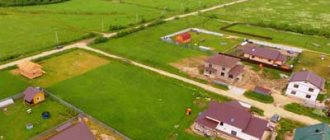Not all lands owned by the state can be used by legal entities or individuals in their own interests.
Most of the lands that can be seen around populated areas belong to a special category of resource called reserve lands.
However, these lands can also be used if the need arises. How exactly can this be accomplished?
Legislative acts
The procedure for disposing of, assigning categories and protecting reserve lands is prescribed in the legislation:
- Land Code;
- federal and regional regulations and laws.
In accordance with the regulatory framework, the use of plots of this type is strictly limited, transfer to private hands is impossible without assigning a category, and responsibility for their condition rests entirely with the entity on whose territory this plot is located.
Security rules
All lands, including unclaimed ones, are under state protection. The protection of reserves consists of:
- in preventing negative impacts or pollution;
- in improving the condition;
- in soil restoration.
The specifics of assessing the condition of plots are enshrined in the legislation of the Russian Federation.
To maintain a favorable environmental situation, not only the state, but also the owners must take care of their limits:
- Protect from weeds.
- Prevent soil erosion.
- Eliminate contamination.
- Maintain fertility levels.
In case of failure to fulfill or improper fulfillment of obligations to preserve the property, the landowner is subject to administrative liability in the form of a fine.
What applies to reserve lands?
The list of territories not subject to transfer into private hands includes:
- located at a far distance from cities, villages, industries and agricultural lands;
- agricultural lands taken out of production due to depletion of their resources;
- reserved forest lands for the construction of industrial facilities;
- unusable reservoirs;
- forests that are currently unsuitable for use.
Land is the most important resource for the state, so it leaves part of the fund in reserve so that the development of space is not chaotic and unsupervised. The development of these territories is possible only in cases of extreme necessity.
Justifications for creating a reserve
PBU 8/01 dictates the conditions under which funds can be accumulated and used by reserving. They must be executed strictly simultaneously:
- the reason for which the reserve funds are intended is conditional, that is, the likelihood that these expenses are not a profitable investment is quite high;
- the feasibility and validity of spending on this conditional occasion can be fairly accurately assessed and supported by documentation.
Reclamation meets these requirements: firstly, the costs for it are not calculated for profit, but are made under a state obligation, and secondly, they can be estimated and, upon use, supported by specific payment documents and accounting entries. Therefore, the creation of a financial reserve for the purpose of land reclamation is fully justified. Important details:
- Usually the reserve is created at the stage of designing the activity;
- if the organization did not previously need to create such a reserve, and then planned reclamation, it can create it from now on, and no errors will arise in the previous accounting;
- if funds were spent on reclamation in the reporting period, and no reserve was created before, the reporting is not distorted, the funds are carried out as expenses for ordinary activities;
- if the failure to create a reserve is recognized as erroneous, then the accounting error must be corrected in the usual manner: according to PBU 22/2010 “Correcting errors in accounting and reporting.”
NOTE! In international financial reporting standards (IFRS), this type of expense is considered the cost of decommissioning fixed assets that harm the earth, for example, oil rigs, mines, etc. Funds for reclamation are initially included in the depreciation cost of these assets.
Legal status
In accordance with the Land Code of the Russian Federation, reserve lands are prohibited from:
- transfer into private hands, both as property and as a lease for any period (Article 96);
- use the fields, forests and reservoirs located on the territory for industrial, agricultural and other needs;
- take any actions to the detriment of the territory and objects located on it.
Legislation allows:
- use of lands by citizens for personal non-industrial purposes: picking berries, mushrooms, fishing, hunting;
- you can be free on the territory, it is not classified as closed;
- it is possible to drive livestock through the reserve lands;
- collection of dead wood for heating a personal home, without harming trees, etc.
In addition, Article 45 of the Land Code of the Russian Federation allows:
- carry out geodetic and cadastral work on the territory;
- examine the soil for minerals;
- conduct training and research work.
In some cases, it is possible to create personal farms of citizens on reserve lands with the permission of the body in whose department the territory is located. Conditions for provision (Article 60 of the Land Code of the Russian Federation):
- the citizen is not a member of the collective farm;
- he does not work in an agricultural enterprise;
- he plans to organize a farm for personal purposes.
State land conservation regulations
The Land Code calls this resource a key component of our environment that needs to be preserved (clause 1, article 13). This provision applies not only to organizations and entrepreneurs, but also to budgetary organizations, as well as individuals - after all, we are all citizens of the state living on this land.
Question: There are land plots provided for the collapse zone of ore bodies, while the mine itself has been liquidated, the land plot on which the mine was located has been handed over. Is it necessary to prepare a separate liquidation project and a reclamation project for land plots under the collapse zones of ore bodies? Please provide an answer with reference to current legislation. View answer
But organizations have a great responsibility. Some of the activities are directly regulated for environmental protection measures:
- landowners, users or tenants are obliged to worry about the timely involvement of land in agricultural circulation - says Art. 101 of the Land Code of the Russian Federation;
- construction – Federal Law No. 7 in paragraph 3 of Art. 37 requires environmental protection and restoration measures during the construction and reconstruction of real estate;
- extractive industries - using subsoil, they inevitably affect the fertility of the land, therefore they must regularly restore it at their own expense - Law of the Russian Federation of February 21, 1992 No. 2395-1 “On subsoil”;
- reclamation organizations;
- carrying out geological exploration work;
- waste storage and disposal;
- any organizations whose activities pollute or violate the integrity of the soil layer on individual land plots.
Question: In what order are expenses for land reclamation recognized for income tax purposes if it is carried out on commissioned facilities (clause 7 of Article 254, clause 1 of Article 261 of the Tax Code of the Russian Federation)? View answer
The procedure for carrying out reclamation is regulated by Decree of the Government of the Russian Federation of February 23, 1994 No. 140 “On land reclamation, removal, preservation and rational use of fertile soil layer.”
FOR YOUR INFORMATION! Last year, the President announced the need to create a Federal Law on Land Reclamation, which would unite all controversial issues that are currently regulated only by industry regulations.
Transfer to another category
Without assigning a category to a site, transfer to private hands on the basis of ownership or lease is impossible. Permission to develop land must be obtained; the violator faces administrative liability for unauthorized seizure of the territory.
The right to use the land is issued by the district administration responsible for the reserve land. When a plot has a specific purpose, it can only be used in accordance with cadastral information.
In what cases is it possible to change the category of reserve lands:
- a decision was made to create an object with a special status on the territory and make the territory closed: a national park, nature reserve, wildlife sanctuary, etc.;
- expansion of the boundaries of the municipality is required: increasing the territory of the city or village;
- it is necessary to build on the site an infrastructure facility for the life of citizens: a power plant, a water pumping station, power lines, roads, a water supply system, an oil pipeline, a medical or educational institution, etc.;
- At the expense of reserve lands, it is planned to strengthen state borders (the land is transferred for defense needs);
- It is planned to develop mineral deposits and extract them, for which it is necessary to build special facilities to facilitate this task.
Other purposes are not grounds for transferring reserve lands to any category.
But even if the goal is included in the listed points, the transfer may take a long time, and the initiator must collect all the justification for the procedure.
Illegal or misuse
The RF Land Code defines the following actions as illegal exploitation:
- construction on unauthorized terrain;
- unauthorized cultivation of agricultural plants;
- illegal mining and use of subsoil;
- damage to water bodies.
When facts of illegal exploitation of municipal property are established, violators are brought to administrative responsibility, and the damage caused to them is not compensated by the state. This means that if a person, for example, built a house without the appropriate permit, the house will be demolished and the person will not receive any compensation.
What is required for translation
Regardless of how the territory is planned to be used and what category it is transferred to, the algorithm will be the same:
- Drawing up a request for transfer. It should reflect:
- the initiator's plans for land development;
- arguments in support of the idea;
- cadastral number of the required plot;
- its dimensions;
- the current category (reserve land) and the one to which the site needs to be transferred.
- Preparation of a package of documents:
- for individuals – passport;
- for legal entities - information about the legal entity from the Unified State Register;
- expert opinion from the environmental commission on the possibility of exploiting the land in the planned way;
- conclusion of a cadastral engineer on land surveying;
- plan of buildings on the territory, detailed description of each object.
- Submit documents and petition to the department to which the allotment belongs:
- for federal lands - the Government of the Russian Federation;
- for regional ones – the executive body of the subject;
- for municipal – local government bodies.
Submission of documents is carried out in two copies, on one of them the receiving party puts down the incoming number and date. This mark guarantees that the application will be considered during a special inspection.
- Wait for the decision:
- positive - in the form of a Resolution on assigning a special category to land;
- negative – an act of refusal. It can be appealed in court.
Grounds for refusal may be:
- the applicant does not have the right to receive land for use or the right to file a petition;
- an incomplete package of documents prepared with errors or inaccurate information;
- the goal is not sufficiently reasoned, the applicant’s idea did not find support from the state;
- goals violate urban planning regulations: incorrectly chosen dimensions, development plans, lands are in a special status, etc.
Termination of reservation
Termination of reservation and, accordingly, the effect of restrictions is possible in one of the following cases:
- The end of the reservation period specified in the reservation decision;
- Providing land for the purposes established by the decision on land reservation;
- Cancellation of the decision on reservation by the body that made the decision on reservation;
- Seizure of a land plot through redemption;
- By the tribunal's decision.
The body that made the decision on reservation, within 30 days from the date of termination of the reservation, is obliged to send an application for lifting restrictions on reserved land plots to the Office of Rosreestr of the Russian Federation.
Time and cost of obtaining a category for reserve lands
The decision-making procedure is divided into two stages.
The first is checking documents for authenticity and compliance with reality. The authorities take 30 calendar days to do this. If violations are found, the applicant receives a certificate of refusal. Papers that pass the verification successfully are sent further.
The second stage is consideration of the application on its merits and the issuance of a decision. Deadlines – 2 months for municipal plots and lands of constituent entities, 3 months – for federal lands.
Submitting a package of documents is free. You will have to pay for the preparatory stage: land surveying, conclusion of the environmental commission and other items.
Tax accounting of reclamation costs
The Tax Code of the Russian Federation prescribes differentiating the time for land reclamation depending on the method of use that led to their violation:
- Development of natural resources. If the organization’s activities were related to the direct use of land, then for tax purposes, reclamation costs are written off evenly over 5 years. Grounds – Art. 261 of the Tax Code of the Russian Federation and explanatory letters of the Ministry of Finance of the Russian Federation dated March 28, 2007 No. 03-03-06/1/177 and dated November 13, 2006 No. 03-03-04/1/754.
- Other activities. If the land was not used for its intended purpose, but was damaged, the costs of its reclamation should be classified as material costs. Reason – subclause 1 of clause 7 of Art. 254 of the Tax Code of the Russian Federation, there is also a corresponding judicial precedent - resolution of the Federal Antimonopoly Service of the Moscow District dated November 27, 2009 No. KA-A40/11724-09, dated July 23, 2009 No. KA-A40/7049-09.
ATTENTION! It is important for companies paying the unified agricultural tax to distinguish between reclamation after land development and other causes of soil fertility disturbance. In the first case, reclamation costs for the Unified Agricultural Tax are not taken into account. In the latter case, when calculating the single tax, reclamation costs must be taken into account as part of material costs (Article 346.5 of the Tax Code of the Russian Federation).
Grounds for refusal
A negative answer may be received in the following situations:
- When the applicant is not the proper person to make such a request.
- If the submitted package of documents does not meet the requirements established by law.
Reserve lands represent a special object in the field of land legal relations, since until their purpose is changed they cannot be used, nor can they be transferred into personal ownership of interested parties. But, in situations where the transfer is completed, the territory can be exploited in accordance with its purpose.









